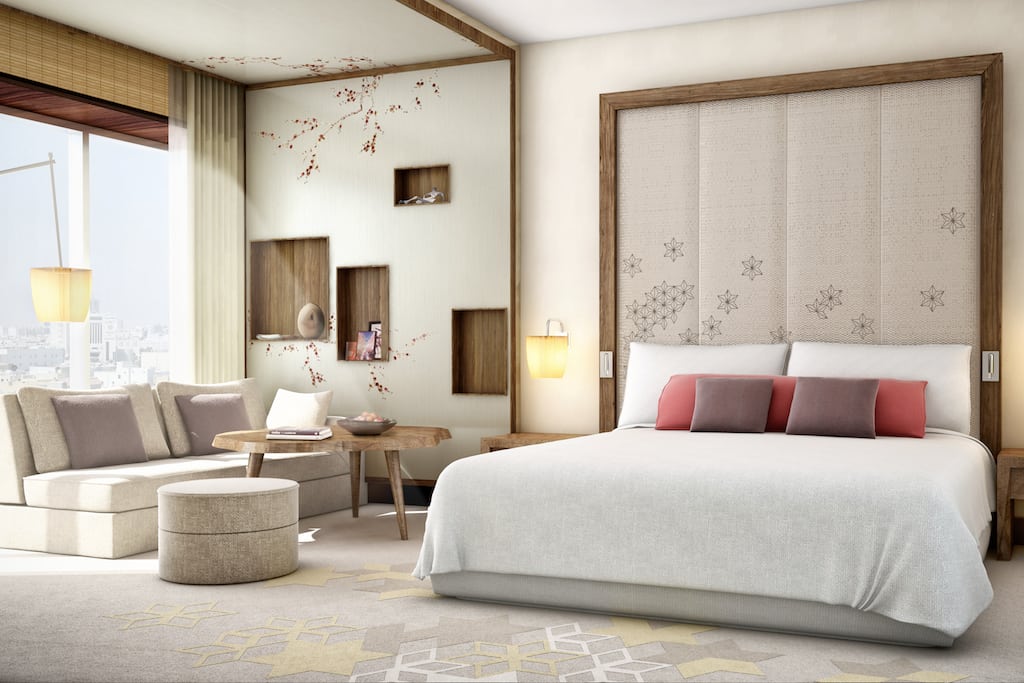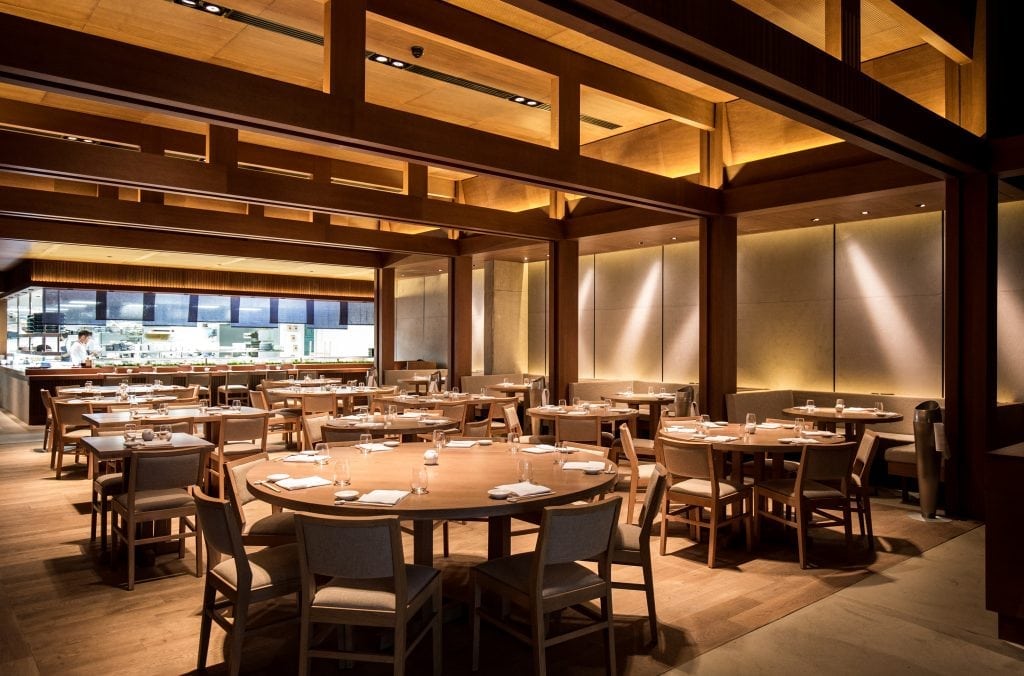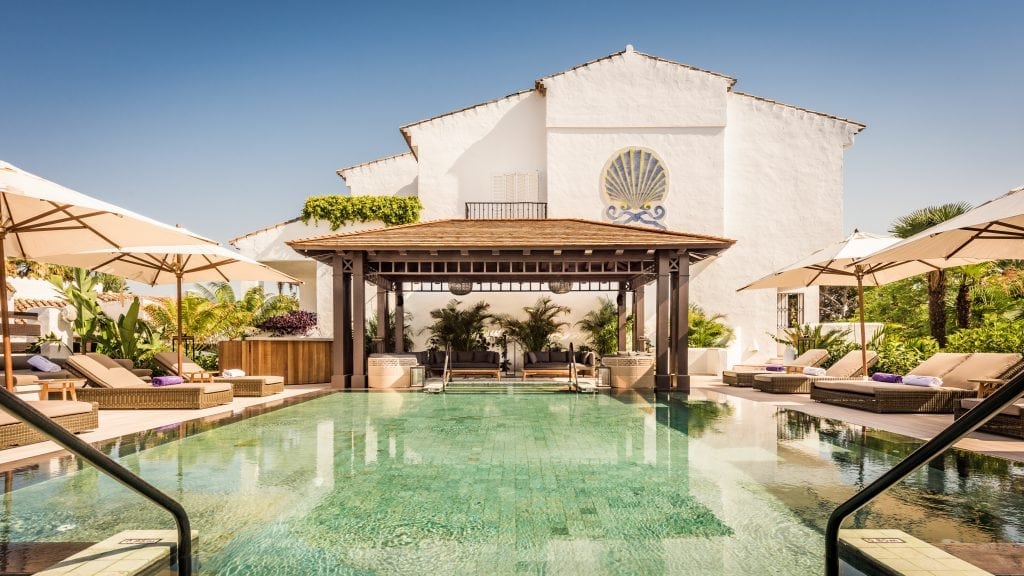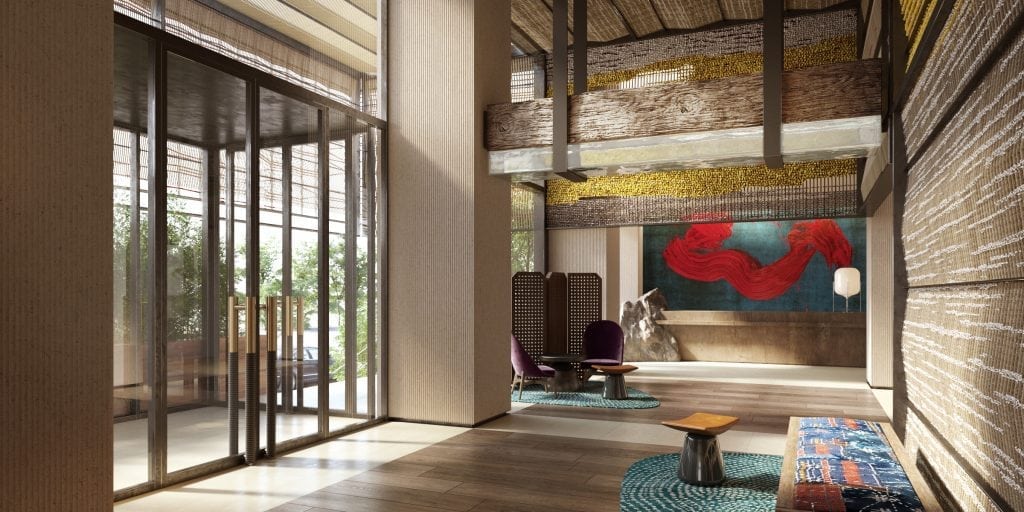Skift Take
It certainly helps to have your hotels named after a wildly successful global restaurant chain, but making sure people don't only think of your brand as a place to eat can be a challenge.
The name “Nobu” is synonymous with an exceptional Japanese dining experience, perfected by chef Nobu Matsuhisa over a more than 30-year career. Matsuhisa, together with actor Robert De Niro and restaurateur Drew Nieporent, opened the first Nobu restaurant in 1994 and to date, there are now 38 Nobu restaurants worldwide.
But if you talk to Trevor Horwell, the CEO of Nobu Hospitality, Nobu represents much more than just a restaurant experience. It’s a true lifestyle brand that also encompasses a relatively small, but growing portfolio of luxury hotels, too — eight of which are open now, and eight more are in the pipeline.
Horwell’s primary focus as CEO is to continue to grow the Nobu Hotels brand and as he opens up diners’ eyes to the fact that cannot only eat at a Nobu but stay at one, too, he hasn’t forgotten the brand’s origins in the process.
“We don’t normally do a hotel unless we think that a Nobu Restaurant can do well in that location,” Horwell told Skift. “That’s very important because what we want to do first and foremost is to make sure there is a draw for locals, and that really comes down to the Nobu Restaurant.”
Horwell said the majority of his Nobu hotel restaurant diners — 80 percent on average — are local residents, not hotel guests. “It’s not like a tourist restaurant. We like to attract the locals. We want that built-in customer.”
Horwell has experience in running hotels that share the same brand as dining establishments. Prior to joining Nobu Hospitality in 2009, he was the chief hotels officer at Hard Rock Hotels and Casinos. While at Hard Rock, he and his team were tasked with “reinventing the brand,” whereas with Nobu, Horwell wants to emphasize the restaurants first and foremost.
“We are defined by the restaurant, in a way,” he said. “We play to our strengths. If you look at the hotel business today, the majority of hotels are suffering because they don’t lead with food and beverage. They don’t have strong food-and-beverage concepts, and a lot of hotels are losing money. Today, we play to our strengths because that is one area that we do very, very well, and we bring in locals.”
The idea to launch Nobu Hotels, he said, came from the fact that when Nobu Restaurants were located inside of a hotel, they “were the draw for the hotel and we were bringing in customers.” He added that converting a Nobu restaurant customer into a Nobu hotel guest is easier to accomplish than what he attempted to do at Hard Rock.
“With Nobu, it’s easier because we are transitioning the same customer into our hotels, whereas with Hard Rock, we had a different level of positioning and we weren’t migrating the café customer into the hotel. It was different,” Horwell said. “If I only convert 5 percent of my customers in Nobu Restaurant to stay in our hotels, then at the end of the day, we’re filling out hotels. It’s not a tall order to do that, and you can do that very well and very quickly if you offer the right product.”
The concept of hotel dining has its roots in the first inns that provided weary travelers not only with a place to sleep but with a place for nourishment. The boutique hotel movement of the 1980s and 1990s saw hotel restaurants became a main draw for guests and locals alike.
Nobu Hotels, however, has the advantage of having built its brand over a 24-year period with its restaurants first, followed by the first Nobu hotel that opened within Caesars Palace Las Vegas in 2013.
“The first focus for us, really, is to expose the brand to our restaurant customers,” Horwell said. “We touch all types of customers. And we also provide instant identity. If you put ‘Nobu Hotel’ on a hotel, the word ‘Nobu’ says something and it attracts a certain type of customer.” Horwell said that, for example, when the first Nobu opened, the hotel had “more than one billion media impressions.”
So, what’s next for the brand, and how does Horwell plan to grow Nobu Hotels? Skift recently spoke to him to ask him for his thoughts on growth, the current state of luxury hospitality, and digital marketing and engagement tactics.
On Growing Nobu Hotels
Horwell doesn’t foresee the brand becoming as large as 150 or 500 hotels or more, but he does want to see growth of at least three to four new hotels a year. He said that, eventually, he could see there being up to 70 or 80 Nobu Hotels, but not something like 500. “We don’t want to be that size,” Horwell said.
As for whether consolidation is impacting Nobu Hotels’ ability to grow, Horwell said “not really.” He explained, “We’re not driven by reservations systems because we’re small. It isn’t as if we need a huge reservations system to fill a 400-room hotel. That’s why a lot of these corporations do well, because they have the reservations platform to fill the big hotels.” Nobu Hotels, by comparison, average anywhere from 100 to 150 rooms generally.
Horwell does, however, see a growing trend of larger hotel corporations looking to buy boutique hotel brands, albeit at the risk of losing “the original identity of the concept,” in the process.
“The reason why those young lifestyle brands have emerged is because they’re like us. They are entrepreneurial, they’re unique because it’s a concept that’s come from the heart, from whoever is the original founder. But when it’s absorbed by a corporation, the whole thing changes. At the end of the day, the specialness is lost because then the corporation’s running it, and then, I think you lose what your original concept was all about. I think that’s the biggest issue.”
On the Current State of Luxury
Horwell also doesn’t necessarily think of Nobu Hotels as occupying a place in luxury hospitality, instead referring to the brand as “special.”
“I look at our hotels not as luxury,” he said. “I look at them as special. I like us to be special, in each location we’re in. ‘Luxury’ is a word that’s used too much in terms of ‘everything is luxury today.’ For us, we’re ‘special.'”
That’s what separates Nobu from other hotels, especially luxury or lifestyle brands run by larger organizations, he emphasized.
“That’s why I’m saying, from a company perspective, we’re very entrepreneurial. A lot of these companies who are big corporations, at the end of the day, you can’t create specialness in the boardroom. That’s what I believe. We have very passionate shareholders within Nobu and we’re there to create something that’s special, like what Nobu did when we originally started.”
Horwell sees Nobu as a brand, “very much like Apple, in a way because we have all types of customers — young customers, older customers — and they mingle in the same place.”
Today’s evolving luxury traveler, Horwelll said, is seeking “youthfulness” no matter what age they are, and they are “very curious and very adventurous.”
Because of that, he said, it’s important for hospitality brands, Nobu included, to not just say they’re unique but to really offer unique experiences. He pointed to Nobu Ryokan Malibu in California as an example. The 16-room retreat overlooks the beach and is right by the ocean, and right next door to the Nobu Restaurant in Malibu.
“It becomes a destination, and that’s something we want to offer,” he said.
It’s also a different concept from what the other Nobu Hotels have. While Nobu Hotels are places where there’s an emphasis on bringing in the locals, the Ryokans are meant to be more private.
“The Ryokan is actually a place where people don’t want to necessarily be seen,” Horwell explained. “It’s a hideaway, a retreat. You can only book through a general manager and it’s a special place.” He added, “We will do more Ryokans, definitely, in locations that we think is right.”
On Engagement and Distribution
A major focus for Horwell this year, in particular, is to grow the company and the brand with the right talent and partners, as well as make sure that the Nobu Hotels brand is reaching the right consumers.
“The most important thing, from our perspective, is to build a relationship with our existing customers,” he said. “It’s about, first and foremost, on digital, working our databases. We like to do that through email, through a lot of channels. We just brought on a new head of digital. Capturing data is very, very important now, and that’s something that is a main focus of her and her team.”
Using that data to enhance the guest experience, especially via mobile, is also crucial.
“I think the main thing for us is the customer relationship management (CRM) because you can do so much with it,” he said. “You can know your customer. It’s one part of the business that we are heavily focused in in and we can extract a lot of information from that.”
In addition to beefing up its customer relationship management system, Nobu is also testing out a loyalty partnership, of sorts. The Nobu London Shoreditch joined Design Hotels last year, giving the property access to distribution on Design Hotels’ site, as well as a connection to the Starwood Preferred Guest loyalty program. Three Nobu hotels are also members of Leading Hotels of the World.
Horwell said he doesn’t see Nobu Hotels having its own loyalty program anytime soon, but for now, he’s “happy” with the partnerships it has with Design Hotels and Leading Hotels. This, even though megamergers between Marriott and Starwood and AccorHotels and Fairmont, respectively, have created luxury giants out of Marriott and AccorHotels, both of which have relatively strong loyalty programs. And at a time with other luxury hotels, Mandarin Oriental included, are launching loyalty programs of their own.
“A lot of our customers aren’t driven by points,” he said. “When I travel, I don’t go for points. I want to stay in a hotel where I enjoy the staff, the food and beverage, the products — all of that — and I will pay a premium for it.”
On the Hospitality Industry’s Future
When Horwell thinks about the future of the hotel industry and where new innovation will come from, he says he sees it as always “evolving” and that it begins with design.
“It starts with shared ideas with the designer and with the partners and you draw from the inspiration of the partners,” he said. “We get a lot of inspiration from our interior designers. We have various interior designers. We also get a lot of inspiration from our partners. We have great partners. They themselves have been around the world and we sit down together and come up with something that is hopefully different and unique and special.”
And while it can be a challenge, at least in some cities, to get hotel projects off the ground, Horwell said he thinks “the hotel business today is very healthy,” and that, as much as people may dismiss it, “millennial culture matters.” “That’s something we’re very focused in and I think that’s something that will change the landscape in the future because I think that even now in retail around the world, that is changing dramatically.”
And for hotels and other businesses to remain competitive, they have to accept the fact that everything is changing, and it’ll keep changing.
“Everybody’s talking about online and how it’s affecting all the retail malls and so forth, whereas I talk to some of the biggest retailers, and we’re doing a couple partnerships now with one of the biggest retailers in the U.S., the Simon Group, and they are saying it’s really about the experience you’re getting at the mall.
“I think it really comes down to the biggest challenges are everybody’s speaking in experience. They want something different. You get a lot of hotels that probably are not providing that and you probably get a lot of hotels that would have to rebrand or do things like that, but I think today, the customer is changing. That’s the biggest challenge. You’ve got to constantly keep ahead of what the customer wants. That’s why we are very focused on that now, and creativity is very, very important.”
And he hopes the industry pays more attention to innovation.
“There hasn’t been very much innovation,” he said. “If you look at the business from an innovation standpoint, like you say, where is the next generation of hotel product coming from? There hasn’t been much that has stirred the markets, but we’re trying to do that naturally within what we are doing. It’s just, to me, I think most chains are doing much of the same. I think that sometimes there has to be new product coming out. I think there has to be more newer, fresh product that is interesting.
Horwell thinks the hotel industry hasn’t kept pace with the changing habits of travelers.
“When I go to a city, I go to a lot of cities in the U.S. and it’s the same boring hotels,” he said. “That’s why I think it’s important that the industry has to somehow update itself, because the customer’s changing. They’ve got to do something for the next generation of customers, and they want an experience. That’s important, same as retail.”
Have a confidential tip for Skift? Get in touch
Tags: branding, dining, nobu, restaurants
Photo credit: The Nobu Hotel Riyadh is set to open later this spring. The hotel side of the business thinks about its restaurant business as the biggest draw. Nobu Hospitality




